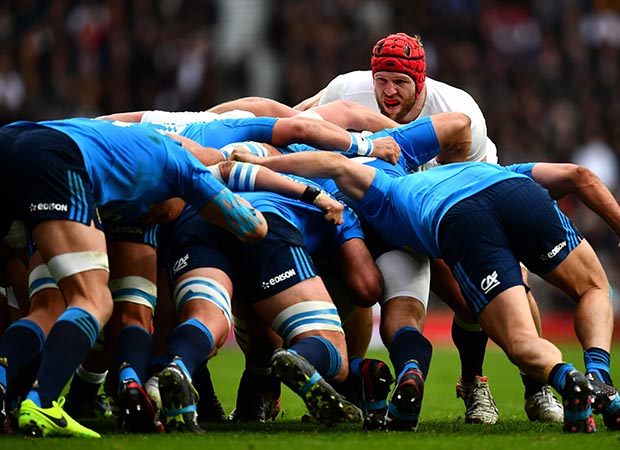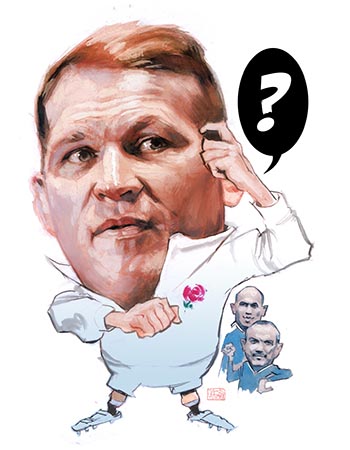 Eddie Jones and his players can thank their lucky stars that their latest tactical tutorial came from Italy. There is a huge amount to admire about England's resurrection under Jones, but the coach and his crew will know better than anyone that their record winning run would have come to an end last weekend if they had been flummoxed against stronger opposition in the way they were by Italy's no-ruck strategy.
Eddie Jones and his players can thank their lucky stars that their latest tactical tutorial came from Italy. There is a huge amount to admire about England's resurrection under Jones, but the coach and his crew will know better than anyone that their record winning run would have come to an end last weekend if they had been flummoxed against stronger opposition in the way they were by Italy's no-ruck strategy.
It is when the stakes get high that any team rely on their senior players – or ‘leadership group' – to rise to the various challenges posed on the pitch. It does not matter whether they come from nefarious opponents, pliable match officials, pitch invasions, flag burning, anthem mangling or food poisoning – you name it – they've got to find a way to get past it and complete England's mission successfully.
At the moment when anything left-field happens England's senior players look clueless, and it is a problem Jones has inherited from Stuart Lancaster. The coach has already spoken about the lack of savvy and initiative in his squad, and has pointed the finger at the overblown support culture in club academies – and we had more proof of it as Italy's defence coach Brendan Venter sprung his no-ruck trap.
For most of the first-half England simply could not get their heads around how to counter Italy's defusing of the offside line by refusing to commit to the ruck after a tackle. To his credit, Dylan Hartley held his hand up this week, saying he needs to know the law book better, and that as captain he should have come up with an immediate initiative to combat it.
However, while it was honest and selfless for Hartley to take it on the chin, it does not alter the necessity for England to flick the mental switch from reactive to proactive.
It is about anticipating ambushes rather than stumbling into them. It is also about players finding a solution on the pitch by themselves rather than waiting for a water-carrier coach to relay instructions from the big boss in the stands.
The simplest solution to countering the no-ruck would have been to set up a driving maul and rumble upfield until Italy joined battle, and an offside line was created. It would have spiked the Azzurri guns straightaway, and given England the forward momentum and structure they wanted.
 However, the Italian tactic highlighted significant issues in the way the game is being refereed, and the fog that World Rugby is allowing to envelop many of the laws, leaving them far too open to refereeing ‘interpretation'.This, in turn, leads to coaches wanting access to referees in pre-match briefings in order to get clarification.
However, the Italian tactic highlighted significant issues in the way the game is being refereed, and the fog that World Rugby is allowing to envelop many of the laws, leaving them far too open to refereeing ‘interpretation'.This, in turn, leads to coaches wanting access to referees in pre-match briefings in order to get clarification.
It is a dog's dinner, and is part of the culture which has grown incrementally in the professional era, in which referees are becoming star turns in the centre of the stage rather than focusing on their main job, which is accuracy and empathy in applying the laws.
This week Bob Dwyer told me that the influence of elite professional referees in the way the laws are being administered is getting out of hand. The Australian World Cup winning coach said: “If top referees were more competent you would not have to have pre-match meetings with them at all – but they are not. We are in the unsatisfactory position where referees are deciding what the laws of the game are. Rather than applying the laws of the game, such as the straight put-in at the scrum, they are deciding what they should be.”
This convinces me that in a professional sport which prides itself on high standards there should no longer be meetings between referees and coaches before matches. Referees and coaches should know the laws inside out, and coaches should be confident they will be applied consistently throughout the pro game.
This would restore confidence that referees have not been manipulated, and one set of coaches given privileged information regarding the application of certain rulings. There was a miasma of this around last weekend's pre-match meeting before the game at Twickenham, with Italy coaches Conor O'Shea and Venter sounding out referee Romain Poite on their no-ruck tactic.
Poite is likely to have sought clarification from his World Rugby line boss, Alain Rolland, with England left in the dark about the information given to Italy. This is dangerous territory, because, even it if it was not the case, it could lead easily to accusations of refereeing impartiality being replaced by collusion,
There are also too many grey areas being left by World Rugby's law-makers. For instance, there has been confusion because the world governing body have only recently ruled that the no-ruck tactic means that the side in possession cannot pull defending players into contact to create a ruck against their will. In the recent past this has been allowed, and it explains Joe Launchbury's confusion against Italy when Poite told him he could not do it.
The idea that the defending side cannot contest possession but can advance around the fringes to within one metre of the attacking side's initial ball receiver – usually the scrum-half – also requires a rethink. The one metre law is another World Rugby introduction, with the law previously stipulating that defenders could advance “near” the tackle.
One metre is tantamount to a big man's outstretched reach, so if you sent three of them round to form a semi-circle to block off the passer's options, why should he be forced to play the ball? Why should he not be allowed to adopt the same waiting game – and as the bore-fest unfolds and the game grinds to a halt, watch the paying public leave the stadium.
World Rugby have a lot to clarify. Uppermost they need to provide their top referees with a law book they can apply with confidence and clarity, and that players can readily understand. It would also benefit from an elite referee's boss who insists on the consistent application of the laws, so that the scourge of the laws being either decided by elite referees, or open to refereeing ‘interpretation', is shut down.
Referees are integral to the well-being of the game, and their expertise should undoubtedly be called on when laws are being debated and changes made by World Rugby.
However, that should not extend to elite referees deciding among themselves which laws they intend to apply – including how, when, and to whom they impart the information – and which they ignore.


























